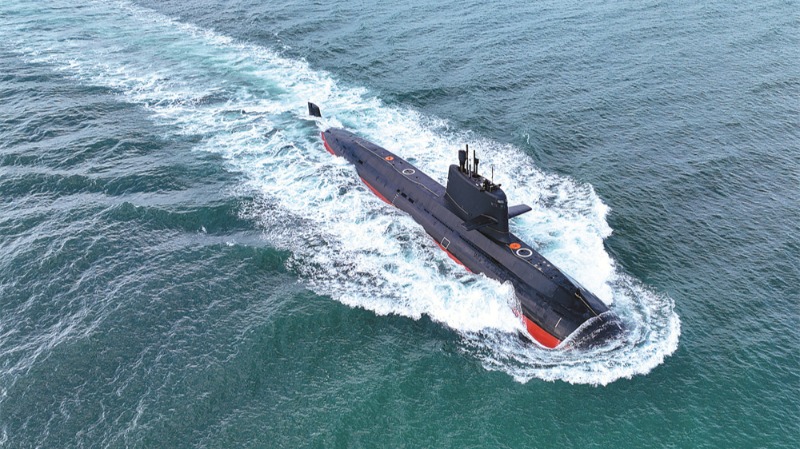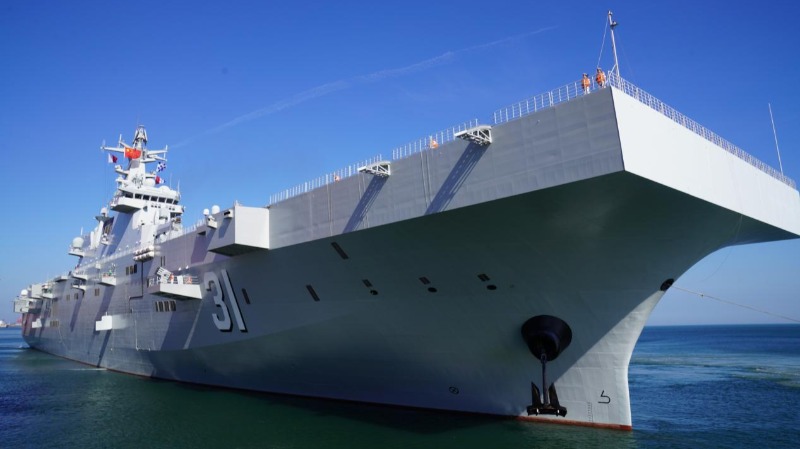By Liu Feng
刘锋
The South China Sea has become a key area for the US to implement its "Indo-Pacific strategy" at present. By leading the Quadrilateral Security Dialogue or Quad, AUKUS trilateral security alliance and other regional security frameworks, the US has gradually militarized the affairs and intensified the confrontation in this region. Instigated by the US and other extraterritorial forces, some Southeast Asian countries have also made more moves in the disputed areas off the waters, which brings negative impacts to the peace and stability of this region.
当前,南海已然成为美国实施“印太战略”的重点区域。美国通过主导美日印澳“四边机制”及“奥库斯”等地区安全框架,让南海地区逐步军事化,对抗性日益明显。东南亚个别国家在美国等域外势力的鼓动下,在南海争议地区的小动作也有所增多,给南海和平稳定带来负面影响。
Such moves touch the spot of the US to some extent. The country is neither categorized into the South China Sea geographically nor a signatory to the United Nations Convention on the Law of the Sea (UNCLOS). However, it has repeatedly clamored the South China Sea issue and deliberately drives a wedge between China and ASEAN countries, in an attempt to find an excuse to intervene in the regional disputes and further achieve its geopolitical goals.
这在一定程度上可以说正中美国下怀,美国并非南海域内国家,也不是《联合国海洋法公约》缔约国,但它一再拿南海问题说事,蓄意挑拨中国与东盟国家关系,目的不过是找借口介入南海纷争,进而达到其地缘政治目的。
In contrast, as the largest coastal country and a major user of the fairways in the South China Sea, China attaches greater importance to regional peace and stability as well as freedom of navigation and overflight than any other country. Its words and deeds on the South China Sea not only consider its own rights and interests but also the legitimate interests of other claimants, especially the overall interests of ASEAN countries.
对比而言,中国作为南海最大沿岸国和南海航道的主要使用国,比任何国家都更重视南海和平稳定以及航行与飞越自由。中国有关南海的言行不仅考虑自身权益,也会兼顾其他声索国的正当利益,特别是东盟国家的整体利益。
On the one hand, for China, it is necessary to break out of the discourse traps long set by the US and the West, including the so-called question that "Whether does China want the South China Sea or Southeast Asia". This is obviously the result of a subjective assumption of China's behaviors based on "Western-centrism" thinking and the strategic stereotype that "a strong country will seek hegemony". It is decided by the peaceful development path of China that it is certain to live in peace and grow in concert with neighboring countries.
一方面,对于中国而言,要跳出美西方长期以来设定的“中国究竟是要南海还是要东南亚”等话语陷阱。这显然是基于“西方中心主义”思维和“国强必霸”战略定式而对中国行为方式主观臆断的结果。中国走和平发展道路决定了我们必然要和周边国家和平相处、共同发展。
Backing to the South China Sea issue, although it neither is an issue simply between China and ASEAN nor represents the entire relationship between China and some Southeast Asian countries concerned, it undoubtedly cannot be evaded for the development of China-ASEAN relations. For the sake of long-term peace and stability in this region, China has been actively advocating restoring the South China Sea issue to its original and substantial nature, desensitizing certain regional topics, and decoupling disputes with the China-ASEAN bilateral relations development. Meanwhile, as to the so-called question that "Whether does China want the South China Sea or Southeast Asia" and other similar contradictory issues distortedly fabricated by the US strategic community, China has always and will deconstruct in a targeted manner and refute straightly and sincerely, so as to further strengthen trust and eliminate doubts over consultations on the Code of Conduct (COC) in the South China Sea and other cooperation agendas, and inject new impetus into the relationship development between China and ASEAN countries.
回归到南海议题,尽管它不是中国与东盟之间的问题,也不是中国与部分东南亚当事国关系的全部,但南海问题无疑又是中国与东盟关系发展所回避不了的。为南海长治久安计,中国一直积极推动南海问题回归其本源和实质,促使南海部分议题脱敏,主动推动南海争议问题与中国东盟关系发展相脱钩。同时,对美国战略界曲意制造的所谓“中国究竟是要南海还是要东南亚”等诸如此类的二元对立问题,中国一直并将继续有针对性地进行解构,开诚布公地予以驳斥回击,以进一步在“南海行为准则”磋商等合作议程上增信释疑,为中国与东盟国家关系发展注入新动力。
On the other hand, for the Southeast Asian countries concerned, the relevant parties should pay special attention to avoid falling into the "prisoner's dilemma" around the South China Sea issue, that is, to blindly seek the utmost interests of themselves but it backfires ultimately. In particular, the countries concerned should be highly vigilant against the "geopolitical traps" plotted by the US. For example, the US incited some countries involved in the South China Sea issue to confront China by claiming to provide support, but the surrounding countries should always be soberly aware that acting as a vassal of the US is dangerous but would only degrade them as its lackey or chess in the region.
另一方面,对东南亚有关当事国而言,有关各方要特别注意避免陷入南海纷争的“囚徒困境”,即一味谋求自身利益最大化但最终适得其反。特别是有关当事国要高度警惕美国布设的“地缘政治陷阱”。例如,美国怂恿鼓噪某些南海争议当事国与中国角力对抗,声称能够提供各种支持,但南海周边国家应该继续保持一直以来的清醒认知,即作为美国的附庸是危险的,充其量只能成为美国在南海的“马前卒”或“棋子”。
It is not rare to see that such incendiary and misleading promises by the US only end up sacrificing greater gains for the relevant countries. The US' conducts on the South China Sea issue are to seek its own interests at the expense of other countries' security essentially. Fundamentally speaking, to make this region the frontline or even a powder keg of great power competition is not in line with the common interests of China and ASEAN countries.
美方类似的颇具煽动性、误导性的承诺最终只会令当事国因小失大,类似例证并不少见,美国在南海问题上的所作所为本质上是以牺牲别国安全来实现自身利益诉求。而南海成为大国竞争的前沿甚至火药桶,根本而言不符合中国和东盟国家的共同利益。
Although it is difficult to resolve the South China Sea issue in a short time, as long as China and ASEAN countries uphold the basic concepts of mutual respect and mutually beneficial cooperation, regional chaos and warfare could be avoided, and it will all be in vain however extraterritorial major countries stir up trouble, thus effectively guaranteeing the peaceful development dividends of the South China Sea.
尽管南海争议短期之内难以解决,但只要中国和东盟国家秉持相互尊重、互利合作等基本理念,南海局势就能避免生乱生战,南海域外大国再怎么煽风点火也都将是徒劳,南海地区和平发展红利将得以切实维护。
(The author is a researcher at Maritime Silk Road Research Base, Hainan Normal University.)
(作者是海南师范大学海上丝绸之路研究院研究员)
Editor's note: Originally published on huanqiu.com, this article is translated from Chinese into English and edited by the China Military Online. The information and opinions in this article do not necessarily reflect the views of eng.chinamil.com.cn.




















